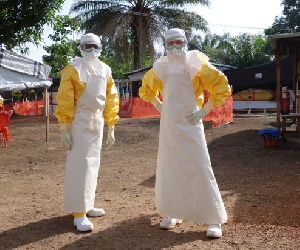The scare of Ebola has discouraged many parents in the Greater Accra region from allowing their children from 0-5 years to be immunized against polio and also receive Vitamin A supplement as a booster to the health of their children.
At the on-going second round National Immunisation Days (NIDs) nationwide, volunteers moving from house to house are facing the challenge of covering every qualified child with the polio vaccine booster.
The three-day exercise, which started on October 30, ended on November 1, 2014.
Speaking to the Ghana News Agency in an interview, Dr John B. Eleeza, Deputy Greater Accra Regional Director in charge of Public Health, said rumours were circulated in some parts of Accra that the ongoing immunisation has a link to Ebola and that had scared some parents to keep their children away from receiving the doses of Polio vaccine and Vitamin A.
He said coincidentally, the Minister of Health, Dr Kweku Agyeman Mensah toured some selected municipalities on Friday and debunked the false rumour and urged parents to allow their wards to be immunized.
Dr Eleeza noted that “health workers cannot go out on their own to give out vaccines that will harm the children of the country. Health workers are there to seek the good health of the people and not jeopardize them”.
Nationally, the campaign is aimed at reaching about 5.7 million Ghanaian children between the ages of 0-5 years with polio vaccine, in a drive to eradicate polio from the African Region whilst children from six months to 5 years are also given Vitamin A supplements.
About 6 million Ghanaian children were immunized during the first round of the campaign in September, 2014.
In Greater Accra, Dr Eleeza said about 875,782 children were expected to be vaccinated against polio whilst 78, 204 children were also expected to be targeted for the Vitamin A supplement.
He noted that it was necessary for Ghana to undertake the nationwide exercise and be part of the synchronized exercise underway in the West Africa sub region because countries like Nigeria and Cameroon, among others, were still endemic, placing Ghana at a higher risk of importing cases of polio.
“Ghana has since 2008 not recorded any polio case and we are on the verge of being declared a polio free country and that means we need to work hard to achieve that goal”.
Dr Eleeza urged parents and guardians not hide their children but to ensure that they were immunized to protect the future leaders of the nation.
Health News of Monday, 3 November 2014
Source: GNA













